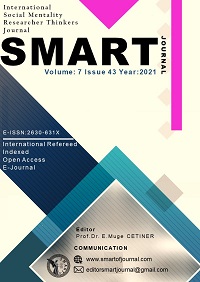THE EFFECT OF SOCIAL MEDIA ON STUDENT’S ACADEMIC PERFORMANCE: CASE STUDY FROM JOBKEY UNIVERSITY IN MOGADISHU-SOMALIA
Author :
Abstract
Today, the Internet has taken a strong position in the lives of people. It isn't easy to imagine a young man who did not check for updates on social networks at least once a day and did not go through the news lines. In this study, the researchers studied the effects of social media on academic performance; the study's main goals were first to examine social media's impact on the student's average grade point (GPA). Secondly, to determine the effects of social media on students' class attendance and finally to investigate the effect of the use of social media on self-image. The sample size of 100 students was selected from job key university students, particularly from the Management Science Faculty. This study used a questionnaire survey with quantitative data collected, so SPSS version 25 was used to analyze data to answer research questions. Based on the results, the study found that social media had a negative impact on students' academic performance. And, the study suggested that the impact of social media on students' academic performance should focus more on the positive side than the opposing side.
Keywords
Abstract
Today, the Internet has taken a strong position in the lives of people. It isn't easy to imagine a young man who did not check for updates on social networks at least once a day and did not go through the news lines. In this study, the researchers studied the effects of social media on academic performance; the study's main goals were first to examine social media's impact on the student's average grade point (GPA). Secondly, to determine the effects of social media on students' class attendance and finally to investigate the effect of the use of social media on self-image. The sample size of 100 students was selected from job key university students, particularly from the Management Science Faculty. This study used a questionnaire survey with quantitative data collected, so SPSS version 25 was used to analyze data to answer research questions. Based on the results, the study found that social media had a negative impact on students' academic performance. And, the study suggested that the impact of social media on students' academic performance should focus more on the positive side than the opposing side.
Keywords
- Annie Ward, Howard W. Stoker, Mildred Murray-Ward. (1996), Achievement and Ability Tests Definition of the Domain. Educational Measurement, 2, University Press of America
- Asemah, E. S., Okpanachi, ,. R., & Edegoh, ,. L. (2013). Influence of Social Media on the AcademicPerformance of the Undergraduate Students of Kogi State University, Anyigba, Nigeria. Research on Humanities and Social Sciences .
- Borders, B. (2010). A brief history of social media. Retrieved December 05, 2010.
- Burak, L. (2012). Multitasking in the University Classroom. International Journal for the
- Burns, V. (2003). Older adolescents’ motivations for social network site use: The influence ofs Carton, S. Defining social media. Retrieved December 05, 2010.
- Cohen, L. S. (2009, April 30). Is There A Difference Between Social Media and Social Networking? Retrieved December 4, 2010, from lonscohen.
- Dueden, C., & Ellis, V. (1995). The effect of attendance on student Learning in Principles of Economics. American Economics Review, 343-346.
- Ellison, N. B., Steinfield, C., Lampe, C. (2007). The benefits of Facebook "friends:" Social capital andcollege students' use of online social network sites. Journal of Computer-Mediated Communication 12 (4), article 1
- Fair, J. E., Tully, M., Ekdale, B., & Asante, R. K. (2009). Crafting lifestyles in urban
- Gafni, R. & Deri, M. (2012). Costs and Benefits of Facebook for Undergraduate Students.gender, group identity, and collective self-esteem, CyberPsychology & Behavior,
- Harman. J. P, Cochran, M. E., & Lindsey (2005). E-Mail Essentials: How to Make
- Hijazi, Syed Tahir and Naqvi, S.M.M. Raza. (January 2006). ‘Factors Affecting Students’ Performance: A Case of Private Colleges’. Bangladesh e-Journal of Sociology: Volume 3, Number 1.
- Hoyle, E. (1986). Policies of School Management, Suffolk. The press ltd. Interdisciplinary Journal of Information, Knowledge, and Management, Vol. 7(2012).
- Kirby, A. & McElroy, B. (2003). The Effect of Attendance on Grade for First Year
- Noble, Julie P., Roberts, William L. and Sawyer Richard L. (October 2006). ‘Student Achievement,Behavior, Perceptions, and Other Factors Affecting ACT Scores’. ACT Research Report Series 2006 - 1.
- Owusu-Acheaw, M., & Larson, A. G. (2015). Use of Social Media and its Impact on Academic Performanceof Tertiary Institution Students: A Study of Students of Koforidua Polytechnic, Ghana. Journal of Education and Practice.
- Paul, J., Baker, H. & Cochran, J. (2012). Effect of online social networking on student academic
- Paul, M. & Gelish, L. (2011). College Students’ Texting Habit and Their Academic Performance.
- Proceedings of the Academy of Educational Leadership, Volume 16(2), pp. 67-72. performance. Computers in Human Behavior, Vol. 28(2012), pp. 2117-2127.
- Raychaudhuri, Amitava, Debnath, Manojit, Sen, Seswata & Majundra, braja Gopal. (2010). Factors affectingStudent’s academic performance: A case study in agartala municipal concial area. Bangladesh e-journal of sociology, vol.7, Number.2.
- Raychaudhuri, Amitava, Debnath, Manojit, Sen, Seswata & Majundra, braja Gopal. (2010). Factors
- Rimskii, V. (2011). The influence of the Internet on active social involvement and the formation Ritholz, B. History of social media. Retrieved December 05, 2010.
- Rodgers, J. R. (2001). A panel-data study of the effect of student attendance on academic Performance, Unpublished manuscript.
- Rosenberg, M. (1995). Society and the Adolescent Self-Image, Revised edition. Middletown, CT: Wesleyan University Press. the Most ofE-Communications.KoganPage Publishers
- Tinto, V. (1993). Leaving college: Rethinking the causes and cures of student attrition (2nd Ed.). Chicago: The University of Chicago.
- Williams, A. Boyd, S. Densten, R. Chin, D. Diamond, and C. Morgenthaler. (2009). “Social Networking
- Privacy Behaviors and Risks”, In Proceeding of CSIS Research Day, Seidenberg School of CSIS, Pace University, USA. 2009.
- Young, Ray. (1999). The relationship between college experience and academic performance.





